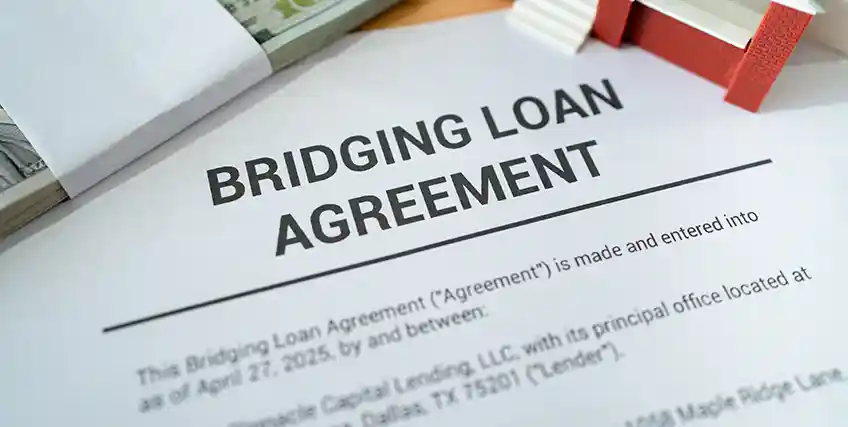Hard Money vs. Bridge Loans What’s the Best Option for Real Estate Investing
August 01, 2025 | Last Updated on: August 01, 2025

Apart from traditional mortgages, you can also choose from asset-based loans, such as bridge loans and hard money loans, which can be suitable when you need financing quickly. However, it’s a good idea to understand the differences between these financing solutions before signing on any dotted lines.
Bridge loans for real estate investors come with two types of financing options that you need to understand before you start making a real estate investment strategy.
In this article, you will understand the difference between the two financing options before you start to make a strategy for real estate investment.
Understanding Bridge Loan
Bridge loans for real estate investors are temporary, asset-backed loans that are intended to "bridge the gap" between now and an imminent financial need. They're perfect for investors with capital tied up in other deals but who don't want to miss out on a timely real estate deal.
For instance, if you're selling an investment property and plan to use the proceeds to buy a new one, but have a timing issue to close on the sale, you might not yet have the cash in hand to make the new purchase. Instead of missing that opportunity, bridge financing enables you to obtain funds on a short-term basis, essentially providing you with cash, allowing you to move quickly.
Commercial bridge loan investing is easy with rapid access to capital that can be obtained when liquidity shortages arise. Additionally, these loans provide the time needed to arrange long-term funding, which can take months to get, depending on the approval protocols.
Quite simply, bridge loans for real estate investors enable them to act swiftly and with confidence, converting timing into a significant advantage.
Benefits of bridge loans
Bridge loans for real estate investors are usually flexible in nature, and can be made to meet your specific needs of investment. They are usually used for purchasing or refinancing residential, commercial, or vacant land for investment requirements. It also helps to bridge the gap in liquidity while waiting for long-term financing.
Just like many other asset-based lenders, a bridge lender would focus mainly on the value of collateral while making a lending decision. This means you would not be asked for income tax returns or pay stubs for getting approved.
However, there are some bridge lenders who can offer a higher loan-to-value or lower bridge loan rates. They will also include the financial health of the sponsor, creditworthiness, background, and real estate experience at risk analysis.
You should also know that bridge lenders specialize in financing high loan amounts and also offer financing for luxury investment properties, such as pre-construction condos and waterfront land for development. All these factors make bridge loans for real estate investors a go-to option for investment.
Drawbacks of bridge loans
Bridge loans for real estate investors don’t work for every real estate investment strategy. Suppose most of the bridge lenders would prefer lending on completed assets, or they will lend against the current value of the asset.
This means that securing bridge loans for real estate investors looking to purchase a fixer-upper can be challenging. Since lenders typically base the loan amount on the property's current value, not the after-repair value (ARV), you may need to borrow less or bring additional funds to the table.
Remember, even though bridge loans for real estate investors may not be ideal for fix-and-flip scenarios, they can be used for refinance and purchase of land.
Understanding Hard Money Loan
A hard money loan is backed by a "hard" asset, i.e., real estate, business equipment, inventory, or vehicles. Within the real estate sector, the loans are typically collateralized by the equity in commercial or residential property.
Unlike traditional lenders, hard money lenders base their lending decisions primarily on the value of the collateral, rather than the borrower's income or creditworthiness. That leads to speedy and straightforward financing ideal for bad-credit investors or poorly documented deals. That's also why bridge loans for real estate investors and hard money refinance are so widely used in time-sensitive deals.
For example, suppose you own a rental property that requires extensive renovation before it can generate revenue. In that case, you can use that asset as collateral and get a hard money loan. The funds obtained from the loan will be applied to finance the rehabilitation, allowing you to stabilize the property and transition into permanent financing once the renovations are complete.
Benefits of hard money loans
Hard money loans come with multiple pros and cons. The first thing that you should know about them is that they require little to no documentation, and you can get approved even with bad credit.
Additionally, you can get approved for hard money loans easily, as their prime focus is the quality of the asset. If an investor is in immediate need of funds, hard money loans are the best option for them.
All these factors make these loan options a good option for investors who want to tap into the equity of their portfolio for purchasing a property type. This easy approval makes it easy for new investors to access the funds quickly to step into the fix-and-flip market.
Drawbacks of hard money loans
If there are benefits of hard money loans, they also have some downsides. First, they do not factor in the creditworthiness or financial strength of the borrower. They generally have higher fees and hard money loan interest rate as compared to traditional loans or any other alternative financing.
Some hard money loans also come with pre-payment penalties if you are planning to pay off your loan early. The prepayment penalty can be a percentage of loan balance or a fixed amount. If you want to consider the option of paying off early, ensure to ask your lender upfront what fees will be associated with it.
Bridge Loan vs. Hard Money Loan
Bridge loans for real estate investors and hard money loans both fall under the category of asset-based loans, which means the loan is secured by collateral, typically real estate, inventory, or equipment. Here, we’ll focus on loans backed by real estate collateral.
Both hard money and bridge loans are short-term funding options, typically ranging from 12 to 36 months, and are usually interest-only loans. Your monthly payments would therefore only cover the interest, with the whole principal paid at loan maturity.
Although both are utilized for the same purposes in commercial real estate, the primary difference between a bridge lender and a hard money lender lies in their approach to risk management. Being familiar with the distinction between a bridge loans for real estate investors and a hard money loan can help investors choose the most appropriate type of loan that best fulfills their needs.
Similarities Between Bridge Loans and Hard Money Loans
Below are some of the similarities between hard money loans and bridge loans for real estate investors:
Higher-interest rates
Bridge loans for real estate investors and hard money loans share several significant similarities. Both typically carry higher interest rates than standard loans because lenders assume more risk and require less income verification.
In terms of rates, asset-based lenders typically have fixed and variable options. Asset-based loans are often interest-only payments, meaning your monthly payment consists solely of the interest. This keeps your expenses low as you wait for the sale of a different property or until you complete renovations to a new property. Bridge loans offer investors the flexibility to act quickly without being burdened by high monthly payments.
Flexibility
Hard money loans and bridge loans for real estate investors can also provide borrowers with additional financial flexibility. You can use these funds for real estate investments and purchases, paying off loans, and bridging the gap between loans.
Short-term
Hard money and bridge loans for real estate investors are a short-term financing solution. Since they have a high interest rate, you should avoid keeping these loans as an outstanding amount for a longer period of time. You should also make sure that you have a plan for how you want to repay these loans. Some of the common strategies for doing this are:
- Refinance the loan
- Sale of the asset
- Payout from other source/investment
Fast approval
Both hard money and bridge loans for real estate investors offer fast financing to investors. Hard money loans don’t care about your credit score or liquidity; they care about whether you require collateral to provide as a guarantee to secure the asset.
Bridge loans for real estate investors may be approved quickly if you qualify. They are also required by borrowers who need them immediately.
Bottom line
Ultimately, there is no one-size-fits-all solution; whether you use a hard money loan or bridge financing depends on your property's value, your ability to pay, and your overall investment strategy. It is neither superior nor inferior; it's about having the right fit.
There are companies that guide real estate investors on how bridge loans work and whether they are suitable for their purposes. Experts provide them with honest advice, outlining the pros and cons of bridge loans so that you are well-equipped to make an informed decision. Through this transparent asset-based lending process, you can be confident in moving forward with your next investment.
FAQs about Hard Money vs. Bridge Loans for Real Estate Investors
Are bridge loans a good idea for real estate?
While bridge loans for real estate investors can be effective for short-term real estate purchases or to cover the duration between buying a home and selling the same. It may not be the best option if you are willing to make a long-term real estate purchase.
What is the alternative to a hard money loan?
Debt Service Coverage Ratio (DSCR) loans provide a decent alternative to hard money. These loans primarily focus on the cash flow of the property instead of the borrowers income. DSCR is calculated by dividing the gross rent by the principal, taxes, interest, and insurance amount.
What is the downside of a bridge loan?
The downside of bridge loans for real estate investors is that they have a higher interest rate and APR as compared to traditional mortgages. They also have limited borrower protections, which usually lack protection for the borrowers if the old home sale falls.
What are the cons of hard money lenders?
Hard money lenders usually charge a high interest rate, as they assume that they have more risk as compared to a traditional lender. They may also require a higher down payment, as compared to a traditional loan, making it a shorter repayment period.
Is interest on a bridge loan tax deductible?
The interest rates of bridge loans for real estate investors can be tax-deductible if your primary residence secures the loan, and the funds are used for buying, building, or substantially improving the home. However it is advised to consult with a tax professional.
Frequent searches leading to this page
Term Loans are made by Itria Ventures LLC or Cross River Bank, Member FDIC. This is not a deposit product. California residents: Itria Ventures LLC is licensed by the Department of Financial Protection and Innovation. Loans are made or arranged pursuant to California Financing Law License # 60DBO-35839




